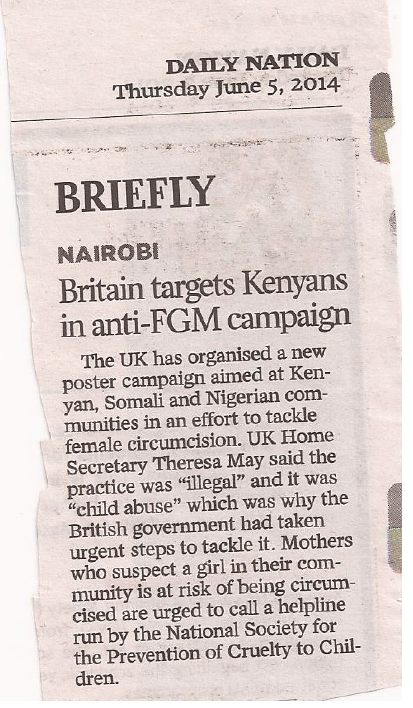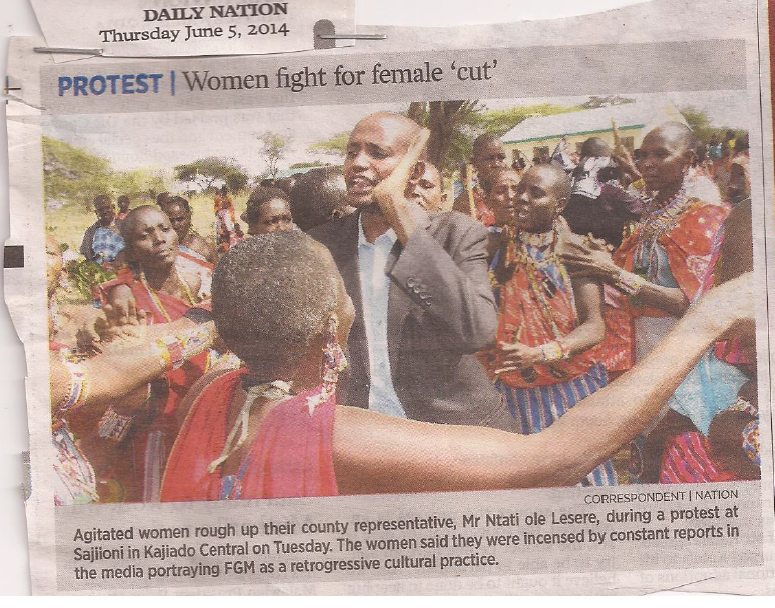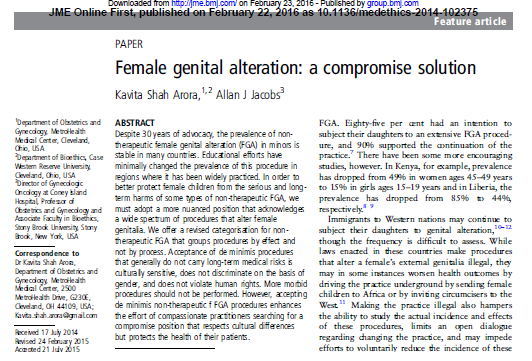
Trying to end FGM in the UK – it’s not easy.
In the UK – FGM has been a criminal offence since 1985. In 2003, the Prohibition of Female Circumcision Act was replaced with The Female Genital Mutilation Act that increased the penalty for those putting their girls through the practise from 5 to 14 years imprisonment.
According to a recent NCPCC (National Society for the Prevention of Cruelty to Children) report, about 23,000 girls under 15 years in England and Wales could be at risk of Female Genital Mutilation (FGM) and there have been 1,700 reported cases in the last 2 years.
According to data published by Equality Now and the City University London in July 2015, approximately 137,000 women and girls are living with the consequences of FGM in England and Wales.
http://www.equalitynow.org/fgm_uk
These statistics, from England and Wales, are unexpected – there are not numbers you expect in Europe. All the women and girls who undergo FGM come from families that have migrated to the UK from regions of the world where FGM is practiced; mainly Africa and some parts of the Middle East and Asia.
Despite all the tough laws, according to the UK’s Serious Crime Act of 2015 ………
To date no-one has been convicted of FGM in England and Wales
So this year (2015), the Female Genital Mutilation Act was extended to include those carrying out FGM on a UK resident outside the UK. This is in line with the fact that almost all the reported FGM among girls in the UK happens outside the UK. So the new Act expects professionals, who include health workers and teachers to report cases of FGM……
The duty applies where the professional either:
- is informed by the girl that an act of FGM has been carried out on her
OR
- observes physical signs which appear to show an act of FGM has carried out and has no reason to believe that the act was necessary for the girl’s physical or mental health or for purposes connected with labour or birth.
When I saw this, I was like hmmm…..‘physical signs that appear to show an act of FGM’? Pray tell me, how do teachers in the UK even know what they are supposed to be looking for? Or how? Never mind the rest of the line that is just meaningless……. reason to believe the act was necessary…..hmmm?
Let’s look at the list of people who are ‘responsible for a girl’ and who could be jailed for 14 years if a girl reports that she has undergone FGM:
To be “responsible” for a girl, the person will either have parental responsibility for the girl (such as mothers, fathers married to the mothers at the time of birth and guardians) and have frequent contact with her, or where the person is aged 18 or over they will have assumed responsibility for caring for the girl “in the manner of a parent”, for example family members to whom parents might send their child during the summer holidays.
The Serious Crime Act of 2015 says any girl who reports FGM will be provided with anonymity …..
Reluctance to be identified as a victim of FGM is believed to be one of the reasons for the low incidence of reporting of this offence. It is anticipated that providing for the anonymity of victims of alleged offences of FGM will encourage more victims to come forward.
Really?
So let’s just assume a girl arrives from a trip abroad after the summer holiday and she has had FGM. She reports the FGM to the teacher who call the police. The police ‘responding to an anonymous tip-off’ raid the girl’s home and those ‘responsible for the girl’ are dragged to court. Who among those ‘responsible for the girl’ will be charged? And what happens to our ‘anonymous tipper’ – where will the girl go? To live with other relatives who have circumcised their daughters but whose girls were ‘wise enough’ not to report them? And what happens to her brothers and sisters – how will ‘justice’ be served? What good will come of it seeing that she is already circumcised anyway?
My two sense worth is that next year the same line will be repeated….
To date no-one has been convicted of FGM in England and Wales
Since most of the FGM carried out on UK residents happens abroad, the Act acknowledges this and mentions UK’s work to end FGM abroad…….
FGM is unlikely to end in the UK before it ends in Africa so the Department for International Development is leading a £35 million flagship programme to support the Africa-led movement to end FGM and is supporting work in 17 countries.
In Kenya, the money is being invested in jailing people involved in circumcision. As I wrote last year, I have misgivings about the way this is going…..
http://healthkenya.co.ke/christmas-circumcision-season-part-ii/
Don’t get me wrong – I totally agree that FGM has never had any value… ever! It must remain a criminal offense -but we have to find other ways of ending FGM that actually work. Criminalising it by putting stringent jail terms and expecting little girls to come forward and destroy their family structure – will take you nowhere….
As a little girl growing up in Kenya, I used to diligently go through magazines that my mother bought. I remember ‘Viva’ the most – which highlighted women’s problems and created vivid images in my mind about how unfair the world was to women. I remember reading about how harmful and unfair female circumcision was – yet when I was in primary school I did ask my mother why I was not circumcised. I was about 9-10 years old and did not really comprehend what the whole thing was about but I was friends with girls who spoke very proudly about their experience and I felt I was missing out on something. My mother told me then that she did not know where it could be done or what it was as she had not gone through it herself. It was only years later that I realised she had lied – it would have been extremely easy for me to get the cut if she had wanted me to.
My friends and I who have gone to school, even those who were circumcised as little girls, would not even imagine putting their daughters through FGM. But it is not fear of going to jail that stops those who do not do it – FGM has lost its value. Yet the practice is still strong in Kenya.
After decades of lobbying, FGM became a criminal offense in Kenya in 2011 but the practice is very much alive in all regions of Kenya but much less so in Western, Nyanza and Coastal communities. Home grown practices of church ceremonies for girls that do not involve circumcision are yielding fruit in some regions but in North-Eastern Kenya, which is predominantly Somali, there has been absolutely no change in the rate of FGM. The Kenya Demographic Health Survey report of 2014 tells us that over 97% of women in North-Eastern Kenya are circumcised.
https://dhsprogram.com/pubs/pdf/PR55/PR55.pdf
How would criminalisation work in a region where everyone is doing it? To end FGM in this region, community issues have to be addressed in a none-judgemental manner – no looking down at people from our ‘oh so superior uncircumcised space’. Female circumcision will stop – but it will be ground to a halt through solutions provided by the very people who practice it. In North-eastern Kenya, Somali men and women know what needs to be done – they have to be listened to.
The presence of foreigners telling people how backward and primitive their practices are make people more determined to keep the practice.
The locals paid from abroad are also bound by the agenda of those that pay them. The voices of the ‘masses’ are silenced or their words re-written to satisfy those with the money, so that the flow of money continues. It is worth re-thinking the whole process.
Foot-binding in China did not end by jailing parents for binding their girl’s feet. The Chinese government made foot-binding illegal – but the Chinese went beyond just making it illegal – they came up with home grown solutions with no foreign aid and they ended the practise. The same holds for FGM – the solution lies within the very same communities that practice FGM – listen to them. Don’t put words into people’s mouths – really listen.




